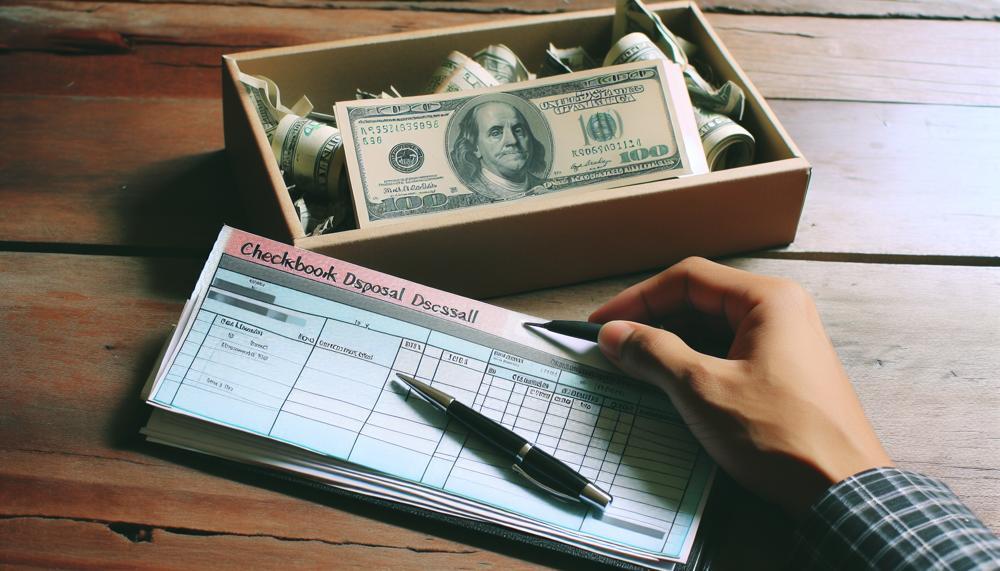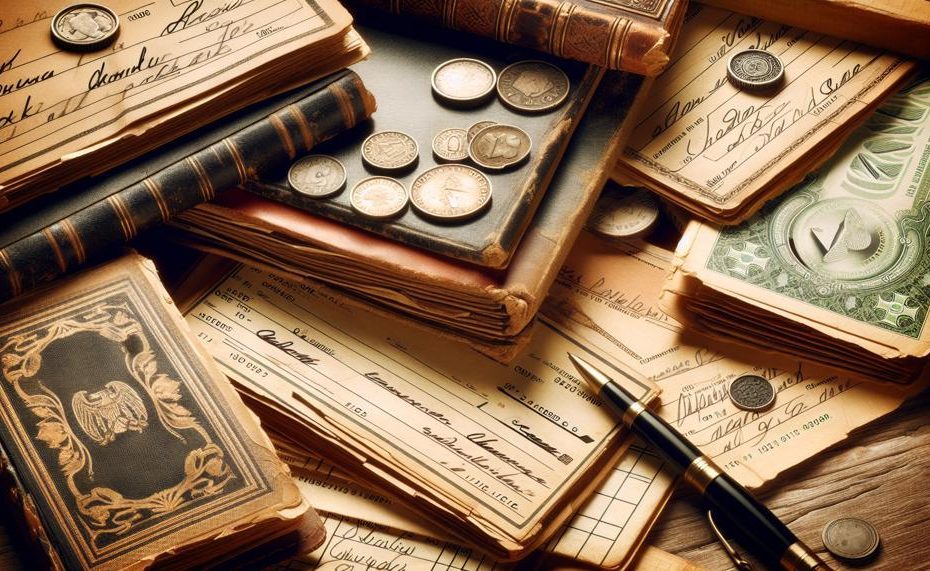Have you ever rummaged through a cluttered drawer? Do you keep stumbling upon old checkbooks from years ago? Are those financial records taking up precious space in your home, making it hard to find what you need?
It’s time to say goodbye to the past and streamline your life.
Before you toss those outdated checkbooks in the trash, it’s crucial to properly dispose of them. This will safeguard your personal information.
The process is simpler than you think.
Let me guide you on how to dispose of old checkbooks with ease.
- First things first, gather all your old checkbooks and other financial documents. This includes any unused checks, carbon copies, or blank checks that may be lying around. Once you have everything in one place, it’s time to shred them. And no, I’m not talking about just tearing them up into pieces. For maximum security, use a cross-cut or confetti shredder that will turn your documents into tiny unreadable bits.
- But what if you don’t have a shredder at home? You can always opt for a secure document destruction service that will take care of shredding for you. Just make sure they use a reliable method like cross-cut shredding.
- Once everything is shredded into oblivion, make sure to dispose of the shredded material in separate trash bags. This will prevent anyone from piecing together your personal information from different shreds. And if possible, consider recycling the shredded paper instead of throwing it away.
- If you have any unused checks left after shredding, contact your bank and cancel them immediately. This will ensure that no one can use those checks fraudulently.
Contents
How Long Should You Keep Old Checkbooks?
The recommended timeframe for retaining old checkbooks is 7 years before disposing of them. This timeline is based on the guidelines set by the Internal Revenue Service (IRS) and tax advisors.
According to the IRS, it is crucial for individuals to maintain records of their financial transactions, including checks, for a minimum of 7 years. This period allows for any potential audits or legal issues to be resolved.
However, it is important to note that this timeframe may differ depending on personal or business circumstances. For instance, self-employed individuals may need to retain records for an extended period of time for tax purposes.
It is advisable to consult with a tax advisor or accountant to determine the appropriate timeframe for keeping old checkbooks.
What to Do With Old Checkbooks
There are several safe disposal methods to consider for getting rid of old checkbooks.
You can shred documents at home or use a professional shredding service. You can carefully burn them, soak them in liquid, pulpify them with baking soda, or take them to the bank for secure disposal. Disposing of old checkbooks correctly is essential. It prevents identity theft and fraud.
The most important thing to remember is that simply tossing them in the trash is not a safe option.
- One option for disposing of old checkbooks is to shred them yourself using a shredder at home or taking advantage of a professional shredding service. This method ensures that all sensitive information is destroyed. It makes it impossible for anyone to use your old checks for fraudulent purposes. However, it is important to ensure that the shredder you use is cross-cut, as strip-cut shredders are not as secure.
- Another option is to carefully burn the old checkbooks. This must be done with caution, as fire can quickly get out of control. It is recommended to soak the checkbooks in water first before burning them, as this will help prevent any potential fires from spreading. Alternatively, you can also soak the checkbooks in liquid. You can also pulpify them with baking soda. This makes it difficult for anyone to decipher any information from the checks.
- Lastly, you can take old checkbooks to the bank for secure disposal. Many banks offer this service for free, ensuring that your personal and financial information remains safe. This is also a convenient option. You can simply drop off your old checkbooks during your regular banking visits.
How to Dispose of Old Checks and Check Carbon Copies

Disposing of old checks and check carbon copies can be a tricky task, but it is essential to do so in a safe and eco-friendly manner. The most recommended method is shredding, as it ensures that all sensitive information on the checks is destroyed and cannot be accessed by anyone else. Plus, shredded paper can also be recycled, making it an environmentally friendly option.
There are several ways to shred old checks and check carbon copies. You can use a personal shredder at home, take advantage of professional shredding services, or simply cut them up with scissors. However, burning old checks is not recommended. It is harmful to the environment and poses a fire hazard.
In addition to shredding, it is crucial to properly dispose of any unused or expired checks that may still be in the checkbook. These can also be shredded or cut up to prevent any potential misuse.
Businesses also need to take precautions when disposing of electronic checks. It is recommended to securely delete all electronic check records and properly dispose of any electronic check readers.
Failing to properly dispose of old checks and check carbon copies can result in legal trouble and financial loss. Therefore, it is vital to record when and how old checkbooks were disposed of. This provides proof in case of any fraudulent activities.
Multiple Options For What to Do With Used Checkbooks
There are multiple options for what to do with used checkbooks that are environmentally-friendly. These include shredding, recycling, burning, and using shredding scissors.
However, it is crucial to properly dispose of old checkbooks to prevent identity theft and fraud. Let’s explore each option in more detail.
Shredding
Shredding is the most recommended and secure method for disposing of old checkbooks.
It guarantees that all sensitive information is destroyed and cannot be accessed by anyone else. You can find shredding services at banks and office supply stores. You can also use a commercial shredder at home.
Recycling
Old checkbooks made of paper, with no plastic components, can be recycled with other paper products.
However, if there are any plastic coverings or inserts, they cannot be recycled and must be disposed of separately.
Sub-Heading: Burning
Burning old checkbooks is not recommended. It releases harmful chemicals into the environment and poses a fire hazard.
Shredding Scissors
For those without shredding services, shredding scissors are an alternative option.
It may take longer and is not as secure as using a shredder. Still, it ensures that sensitive information is destroyed.
Conclusion
In conclusion, saying goodbye to your old checkbooks is a necessary step. Decluttering and simplifying your life.
However, it’s crucial to handle this task with care and responsibility. This will safeguard you from identity theft and fraud. The most recommended method is shredding, whether at home or through professional services.
Other options, such as recycling or burning, may seem tempting. However, they come with potential risks and are not advised. Another option is using shredding scissors for added convenience.
By following these steps, you can declutter your space. You can also protect your personal information and contribute to sustainable practices.





